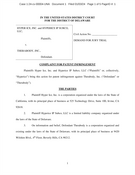-
Implicit, LLC v. CA, Inc. DC
-
2:19-cv-00038 Copied
- E.D. Tex.
- Filed: 02/04/2019
- Docket updated daily
-
-
Implicit, LLC v. CA, Inc. DC
-
2:19-cv-00038 Copied
- E.D. Tex.
- Filed: 02/04/2019
- Docket updated daily
-
